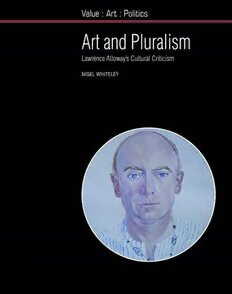
Art and Pluralism: Lawrence Alloway’s Cultural Criticism PDF
Preview Art and Pluralism: Lawrence Alloway’s Cultural Criticism
Art and Pluralism Lawrence Alloway’s Cultural Criticism Value : Art : Politics welcomes proposals for books of all kinds committed to the socio-historical study of the value and meaning of art, past and present. Series editor Jonathan Harris Editorial board members Professor John Barrell Professor Fred Orton Independent scholar Independent scholar Professor David Craven Professor Griselda Pollock University of New Mexico University of Leeds Professor Albert Boime Professor Paul Smith University of California, Los University of Warwick Angeles Professor John Tagg Professor T. J. Clark Binghamton University, State Independent scholar University of New York Professor Stephen J. Eisenman Professor Anne M. Wagner Northwestern University Independent scholar Professor Jonathan Harris Professor Alan Wallach University of Liverpool College of William and Mary, Williamsburg Professor Amelia Jones University of Manchester Art and Pluralism Lawrence Alloway’s Cultural Criticism Nigel Whiteley LIVERPOOL UNIVERSITY PRESS art and pluralism art and pluralism First published in 2012 by LFiivrsetr ppouobll iUshneidv eirns it2y0 1P2r ebsys Live4r pCoaoml bUrnidivgeer sSittrye ePtr ess 4 CamLibvreirdpgoeo Sl treet LLi6v9e r7pZoUol L69 7ZU Copyright © Liverpool University Press, 2012 Copyright © Liverpool University Press, 2012 The right of Nigel Whiteley to be identified as the author of this book has beThene arsisgehrtt eodf bNyi gheilm W inh iateclceoyr dtoa nbcee iwdeitnht itfiheed Caso pthyer igauhtth, oDr eosifg tnhsi sa nbdo oPka theanst s been asserted by him in accordancAe cwt i1t9h8 8th.e Copyright, Designs and Patents Act 1988. All rights reserved. No part of this book may be reproduced, stored in a rAetlrl ierivgahl tssy rsetesemrv, eodr. tNraon spmarittt eodf ,t hinis abnoyo fko rmma yo rb be yr eapnryo dmuecaends, , setolercetdr oinni ca, merecthraienviacla ls,y pstheomto, coorp tyrianngs,m reitctoerdd, iinng ,a noyr ofothrmer woirs eb,y w ainthy omute atnhse, perleiocrt rwonriitct,e n mechanical, photocopyinpge, rrmeciossridoinn go,f otrh eo tphuebrwlisihsee,r .without the prior written permission of the publisher. British Library Cataloguing-in-Publication data BritAis hB Lriitbisrha rLy ibCraatrayl oCgIuPin rge-cionr-dP uisb laivcaatiliaobnl edata A British Library CIP record is available ISBN 978-1-84631-645-6 Web PDISFB eNIS B97N8 -91-7884-613-18-466435-16-670-8 Typeset by Carnegie Book Production, Lancaster Printed Tanydp ebsoetu nbyd Cbya rCnePgIi eG Broouopk (PUroKd)u Lcttido,n C, Lroayndcoanst eCr R0 4YY Printed and bound by CPI Group (UK) Ltd, Croydon CR0 4YY For Sylvia, at last Contents contents List of Plates xi Acknowledgements xiii Section A: Introduction 1. Alloway and pluralism 3 2. Background 7 3. The British art scene 11 4. Early career 14 Section B: Continuum, 1952–1961 1. Art criticism, 1951–1952 21 2. The ICA in the early 1950s 25 3. The Independent Group: aesthetic problems 28 4. The Independent Group: popular culture 32 5. Art criticism, 1953–1955 38 6. Alloway and abstraction 43 7. Alloway and figurative art 47 8. This Is Tomorrow, 1956 50 9. Information Theory 53 10. Group 12 and Information Theory 56 11. Science fiction 59 12. The cultural continuum model 62 13. Writings about the movies 72 14. Graphics and advertising 78 15. Design 82 viii art and pluralism 16. Architecture and the city 86 17. Channel flows 91 18. Art autre 95 19. The human image 99 20. Modern Art in the United States, 1956 106 21. Action Painting 111 22. First trip to the USA 115 23. The New American Painting, 1958 118 24. Alloway and Greenberg 121 25. Cold wars 125 26. British art and the USA: The Middle Generation 128 27. A younger generation and the avant-garde 132 28. Hard Edge 138 29. Place and the avant-garde, 1959 141 30. Situation and its legacy 147 31. The emergence of Pop art 154 32. Alloway’s departure 159 Section C: Abundance, 1961–1971 1. Arrival in the USA and “Clemsville” 167 2. Junk art 171 3. American Pop 175 4. Curator at the Guggenheim 177 5. Six Painters and the Object and Six More, 1963 180 6. Other writings on Pop 186 7. Art as human evidence 189 8. Alexander Liberman and Paul Feeley 196 9. Systemic Painting, 1966 201 10. Abstraction and iconography 207 11. The communications network 213 12. Departure from the Guggenheim 220 13. Exile in Carbondale 223 14. Arts Magazine 227 contents ix 15. The Venice Biennale 231 16. Return to New York: SVA, SUNY, and The Nation 237 17. Options 239 18. Expanding and disappearing works of art 244 19. Alloway’s Nation criticism 248 20. Newness and the avant-garde 252 21. Post-Minimal radicalism 258 22. Historical revisions: Abstract Expressionism and Picasso 263 23. Mass communications 270 24. Film criticism 274 25. Violent America 279 26. Pluralism as a “unifying theory” 286 Section D: Alternatives, 1971–1988 1. Disorientation and dissent in the art world 291 2. Alloway and the politicization of art, 1968–1970 296 3. Changing values, 1971–1972 304 4. Artforum and the art world as a system 307 5. 1973 and a new pluralism 313 6. The uses and limits of art criticism 320 7. Criticism and women’s art, 1972–1974 326 8. Women’s art and criticism, 1975 334 9. The realist “renewal” 338 10. Photo-Realism 343 11. The realist “revival” 348 12. Realist revisionism 356 13. The decline of the avant-garde 360 14. “Legitimate variables” 364 15. Earth art 368 16. Public art 372 17. In praise of plenty 376 18. Crises in the art world: criticism 378 19. Crises in the art world: feminism 385
